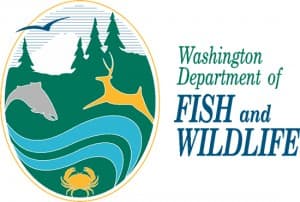Washington DFW: Commission Approves New Columbia River Fishing Policy
OutdoorHub 01.13.13

The Washington Fish and Wildlife Commission today unanimously adopted a policy that establishes a new management framework for salmon fisheries on the lower Columbia River.
The commission, a nine-member citizen panel that sets policy for the Washington Department of Fish and Wildlife (WDFW), took action after completing a series of public meetings that began in October 2012. In all, the commission received about 1,000 public comments on the broad-based proposal.
Key provisions of the new policy will allocate more of the catch to sport fisheries, gradually shift non-tribal commercial gillnets to off-channel areas stocked with more hatchery salmon, and spur development and use of new selective gear for commercial fisheries on the mainstem Columbia River.
The new policy also requires anglers to use barbless hooks when fishing for salmon and steelhead in the Columbia River. The commission directed the department to adopt rules to make permanent a temporary barbless hook rule that took effect Jan. 1.
Miranda Wecker, commission chair, said the new policy is designed to support conservation of wild salmon and expand the economic benefits the state derives from sport and commercial fisheries.
“This policy realigns Columbia River fisheries to achieve a number of longstanding goals,” she said. “It also includes annual reviews, giving the commission an opportunity to make changes if the new policy falls short of those goals.”
The changes are based on recommendations made by representatives from the Washington commission and its Oregon counterpart and comments received during the extensive public review. The Oregon Fish and Wildlife Commission approved a similar management framework for Columbia River fisheries last month.
“For nearly 100 years, our two states have managed Columbia River fisheries under a reciprocal agreement,” Wecker said. “Without a common framework, effective management of those fisheries would be impossible.”
The policies adopted by both states include plans to phase out the use of gillnets by 2017 in non-tribal fisheries on the Columbia below Bonneville Dam. They also include commitments to increase the number of fish stocked in off-channel areas to off-set reductions in commercial fishing opportunities on the mainstem of the Columbia.
The anticipated move of gillnets to off-channel areas depends on the success of developing and using alternative selective gear, said WDFW Director Phil Anderson.
“A key goal of this policy is to maintain or increase the economic viability of both recreational and commercial fisheries,” he said. “The timetable established in the policy depends on achieving that goal.”
Anderson said the changes outlined in the policy will allocate more salmon and steelhead to recreational fisheries, but will not necessarily reduce the incidental catch of wild salmon and steelhead protected under the federal Endangered Species Act (ESA).
“Impacts on ESA-listed salmon are tightly regulated in both fisheries,” he said. “But the successful development of selective commercial gear would allow the harvest of more hatchery salmon, reducing interactions between hatchery fish and wild salmon in natural spawning areas.”
In other business, the commission approved the sale of the state’s Colville Fish Hatchery to Stevens County, which plans to use it as an educational and vocational learning center. WDFW closed the 95-year-old facility last June in response to state budget cuts, and plans to sell it to the county for its appraised value of $150,000.
“This is really a win-win for the department and Stevens County,” said Commission Vice Chair Gary Douvia, who lives in Colville and helped to champion the sale. “While the hatchery may be past its prime, it’s still a real asset for the community.”
In addition, the commission received briefings on:
- Octopus management: WDFW outlined plans to work with the diving community and other members of the public to develop a plan to increase protection for the giant Pacific octopus population in Puget Sound. Fishery managers will hold public meetings, develop a proposal, and submit it to the commission in the next few months.
- Sportfishing rules: Fish managers provided an overview of the 69 proposed fishing rules – ranging from new opening dates for some trout lakes to a new size limit for cabezon –they recommend the commission consider adopting this year. The deadline for public comment on the proposal is Jan. 29. Information is available on the WDFW website at http://wdfw.wa.gov/fishing/regulations/rule_proposals/.

